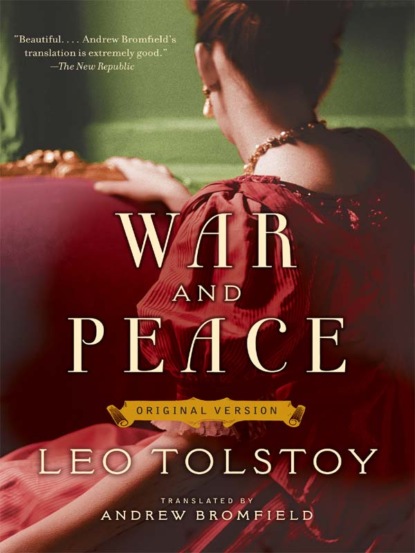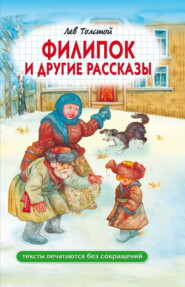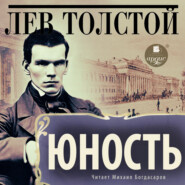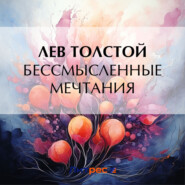По всем вопросам обращайтесь на: info@litportal.ru
(©) 2003-2025.
✖
War and Peace: Original Version
Автор
Год написания книги
2019
Настройки чтения
Размер шрифта
Высота строк
Поля
“Natasha,” said Vera to her younger sister, who was intently sorting through the scented gloves. “Why do Nikolai and Sonya run away from me? What secrets do they have?”
“Why, what business is it of yours, Vera?” Natasha asked protectively in her squeaky voice, continuing with her work. She was evidently feeling even more kind and affectionate towards everyone because of her own happiness.
“It’s very stupid of them,” said Vera in a tone that Natasha thought sounded offensive.
“Everyone has their own secrets. We don’t bother you and Berg,” she said, growing heated.
“How stupid! You’ll see, I’m going to tell mama how you carry on with Boris. It’s not right.”
“Natalya Ilinishna treats me perfectly well. I can’t complain,” he said sarcastically.
Natasha did not laugh and looked up at him.
“Don’t, Boris, you’re such a diplomat” (the word diplomat was very popular with the children, in the special meaning which they gave to this word), “it’s really boring,” she said. “Why is she pestering me?”
She turned to Vera.
“You’ll never understand,” she said, “because you’ve never loved anyone, you have no heart, you’re nothing but Madame de Genlis” (this nickname, which was regarded as very insulting, had been given to Vera by Nikolai) “and your greatest pleasure is to cause trouble for others. You can flirt with Berg as much as you like.”
She blurted this out hurriedly and flounced out of the nursery.
The beautiful Vera, who had such an irritating, disagreeable effect on everyone, smiled again with the same smile that meant nothing and, apparently unaffected by what had been said to her, went up to the mirror and adjusted her scarf and hair. As she gazed at her own beautiful face, she visibly turned colder and calmer than ever.
XVIII
In the drawing room the conversation was continuing.
“Ah, my dear,” said the countess, “in my life too not everything is roses. Do you think I cannot see that with the way we live, our fortune will not last long? And it’s all the club, and his generous nature. When we are in the country, what rest do we get there? Theatres, hunts and God knows what else. But there I am talking about myself! Now, how did you arrange everything? I am constantly amazed at you, Annette, at your age, the way you gallop off in a carriage on your own, to Moscow, to St. Petersburg, to all the ministers and all the important people, and you know how to deal with them all, I am amazed! Well, how did everything go? I don’t know how to do anything of that sort.”
“Ah my darling,” replied Princess Anna Mikhailovna. “God grant that you may never know how hard it is to be left a widow with no support and with a son whom you love to distraction. One can learn to do everything,” she continued with a certain pride. “My lawsuit taught me that. If I need to see one of these bigwigs, I write a note: ‘Princess so-and-so wishes to see so-and-so’, and I go myself in a cab, two or three times if necessary, even four, until I get what I want. I don’t give a jot what people think of me.”
“Well, how did you ask for Borenka?” asked the countess. “After all, your son is a Guards officer, but Nikolai is going as a cadet. I have no one to intercede for me. Whom did you petition?”
“Prince Vasily. He was very kind. Now he has agreed to everything, and informed His Majesty,” Princess Anna Mikhailovna said ecstatically, completely forgetting all the humiliation that she had gone through to achieve her goal.
“And has he grown old, Prince Vasily?” the countess asked. “I haven’t seen him since our dramatics at the Rumyantsevs’. I think he has forgotten all about me. He used to run around after me,” the countess recalled with a smile.
“He is the same as ever,” replied Anna Mikhailovna. “The prince is courteous, positively brimming over with compliments. His high position has not turned his head at all. ‘I regret that I can do so little for you, my dear princess,’ he said to me, ‘ask what you will.’ Yes, he is a splendid man and an excellent relative. But you know, Nathalie, how I love my son. I don’t know what I would not do for his happiness. And my circumstances are so bad,” Anna Mikhailovna continued sadly, lowering her voice, “so very bad that I am now in a quite appalling situation. My miserable lawsuit is consuming everything I have and never makes progress. Can you believe that I do not have, literally do not have, ten kopecks to spare, and I have no idea where to get the money for Boris’s uniform.” She took out a handkerchief and began to cry. “I need five hundred roubles, and I have one twenty-five-rouble note. I am in such a state. My only hope now is Count Kirill Vladimirovich Bezukhov. If he will not support his godchild – after all, he is Boris’s godfather – and provide him with something to live on, then all my efforts will have been wasted, I shall have no money to fit him out.”
The countess shed a few tears and pondered something without speaking.
“I often think, perhaps it is a sin,” said the princess, “but I often think: there is Count Kirill Vladimirovich Bezukhov living alone … it’s an immense fortune … and what is he living for? Life is a burden to him, and Borya is only about to start living.”
“He is bound to leave something to Boris,” said the countess.
“God knows. These rich men and grandees are such egotists. But nonetheless I shall go to him now, and take Boris, and tell him to his face what is the matter. Let people think what they will of me, I really do not care, when my son’s destiny depends on it.” The princess got to her feet. “It is now two o’clock. And you are dining at four. I shall have enough time to go there and back.” And with the bearing and manners of a practical St. Petersburg lady who knows how to make good use of her time, Anna Mikhailovna sent for her son and went out into the front hall with him.
“Goodbye, my darling,” she said to the countess, who saw her to the door. “Wish me success,” she added, whispering so that her son would not hear.
“You are going to Count Kirill Vladimirovich, ma chère,” the count said from the dining room as he emerged into the hallway. “If he is feeling better, invite Pierre to dine with us. He has been here before, he danced with the children. You absolutely must invite him. Well, we shall see how Taras excels himself today. They say Count Orlov never had such a dinner as we shall have today.”
XIX
“My dear Boris,” Princess Anna Mikhailovna said to her son as Countess Rostova’s carriage, in which they were sitting, drove along the straw-covered street and into the wide, sand-strewn courtyard of the unfamiliar colonnaded house belonging to Count Kirill Vladimirovich Bezukhov. “My dear Boris,” said his mother, freeing her hand from under her old coat and laying it on her son’s arm in a gesture of timid affection, “please, set aside your pride. Count Kirill Vladimirovich is after all your godfather, and your future fate depends on him. Remember that, be nice, as you know how to be.”
“If only I knew that anything would come of it, apart from humiliation,” her son replied coldly. “But I promised and I am doing it for you. Only this is the last time, mama. Remember that.”
Even though the carriage was standing at the entrance, the doorman scrutinised the mother and son who, without giving their names, had walked straight up between the two rows of niched statues and into the glazed vestibule, and he asked, casting a significant glance at the countess’s shabby coat, whom they wished to see, the princesses or the count, and, on learning that it was the count, he informed them that his excellency was feeling worse today and his excellency was not receiving anyone.
“We can leave,” the son said in French, evidently delighted at this news.
“My friend!” the mother said in an imploring tone of voice, touching her son’s arm again, as though this touch could calm or excite him.
Boris, fearful of creating a scene in front of the doorman, said nothing, with the expression of a man who has decided to drain his bitter cup to the last drop. Without unbuttoning his greatcoat, he looked enquiringly at his mother.
“My dear fellow,” said Anna Mikhailovna in a soft voice, addressing the doorman, “I know that Count Kirill Vladimirovich is very ill … that is why I have come … I am a relative … I will not disturb him, my dear fellow … And I would only need to see Prince Vasily Sergeevich, he is staying here, after all. Announce us, please.”
The doorman tugged morosely on a cord leading upstairs and turned away.
“Princess Drubetskaya to see Prince Vasily Sergeevich,” he called to the footman in knee-breeches, shoes and tails, who had come running down and was peering out from under the overhang of the stairs.
The mother straightened the folds of her dyed silk dress and, with a glance at herself in the tall Venetian pier glass set into the wall, strode briskly up the stair-carpet in her down-at-heel shoes. “My dear, you promised me,” she said again to her son, trying to rouse him with the touch of her hand. Lowering his eyes, the son walked on gloomily.
PRINCESS ANNA MIKHAILOVNA DRUBETSKAYA AND HER SON BORIS Drawing by M.S. Bashilov, 1866 (#ulink_c91d9f57-55d1-5139-81fa-380a2f824409)
They entered a hall from which one of the doors led into the chambers allotted to Prince Vasily.
As the mother and son, walking out into the centre of the room, were contemplating asking the way from an old footman who had jumped to his feet at their arrival, the bronze handle of one of the doors turned and Prince Vasily emerged, dressed simply in a velvet smoking jacket with only a single star, accompanied by a handsome, dark-haired man. This man was the famous St. Petersburg physician Lorrain.
“So it is definite,” the prince was saying.
“Prince, errare est humanum, but …” the doctor replied, burring his r’s and pronouncing the Latin words with a French accent.
“Very well, very well …”
Noticing Anna Mikhailovna and her son, Prince Vasily dismissed the doctor with a bow and approached them without speaking, but with an interrogatory air. The son was astonished to see the profound grief that was suddenly expressed in Princess Anna Mikhailovna’s eyes.
“Indeed, what distressing circumstances we are obliged to meet in, prince … Well, how is our dear invalid?” she said, disregarding the cold, insulting gaze directed at her and addressing the prince as her best friend, with whom she could share her woe. Prince Vasily looked in baffled enquiry, first at her, then at Boris. Boris bowed politely. Prince Vasily, making no response to the bow, turned back to Anna Mikhailovna and answered her question with a movement of the head and lips which signified the very worst prospect for the invalid.
“Surely not!” exclaimed Anna Mikhailovna. “Oh, that is terrible! The very idea is appalling … This is my son,” she added, indicating Boris. “He wished to thank you himself.”
Boris bowed politely once again.
“Believe me, prince, a mother’s heart will never forget what you have done for us.”
“I am glad to have been able to do something to please you, my dear Anna Mikhailovna,” said Prince Vasily, adjusting his jabot, expressing far greater self-importance with his gesture and tone of voice to his satisfied suppliant here in Moscow than he had managed in St. Petersburg, at Anna Scherer’s soirée.
“Try to serve well and be worthy,” he added, addressing Boris with severity. “I am so glad … Are you here on leave?” he enunciated in his impassive tone of voice.

















